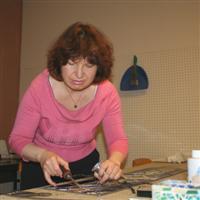From Russia To The U.S.: Anna Kronick's Change Of Life
 |
| Anna Kronick at work at Suncatcher Glass on Main Street in North Adams. |
 |
| Anna Kronick at work at Suncatcher Glass on Main Street in North Adams. |
| If you would like to contribute information on this article, contact us at info@iberkshires.com. |